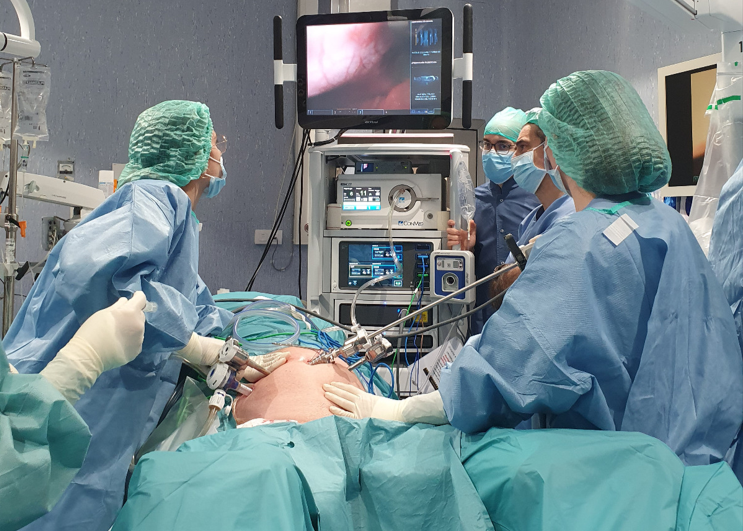
Professionals from the Urology Department of the Hospital Universitario de Girona Josep Trueta and researchers linked to the Institute of Biomedical Research of Girona (IDIBGI) are carrying out a study aimed at improving the surgical approach to prostate cancer by introducing the sentinel lymph node technique. The procedure consists of detecting the first lymph node where there are tumour cells and from which they spread to the rest. If this technique is validated, it will be possible to avoid removing the rest of the lymph nodes in the pelvic lymphatic system, which means less aggressive surgery and, consequently, a better recovery for the patient.
Since the study began in mid-2023, Trueta's Urology Department has performed the sentinel lymph node technique on eight patients with prostate cancer to analyse the preliminary results and define the mechanisms that will later allow the widespread implementation of a procedure that is already used in surgery for other types of cancer, mainly gynaecological cancers such as breast, endometrial, vulvar and cervical cancers.
"Through this study we will be able to assess the information provided by the sentinel lymph node and determine the coordination protocols with other hospital services in order to be able to introduce this technique in the future to treat prostate tumours. It will also help us to better identify those cases in which the technique is most effective," explains Dr Josep Comet, head of the Urology Department at Trueta. This task will be extended during 2024, with the plan to perform two interventions per month with the sentinel lymph node technique in order to accumulate more data and detail the efficiency of the procedure.
The sentinel lymph node technique consists of injecting a radiopharmaceutical into the patient's prostate gland, which is a substance with a minimal dose of radiation that, once administered, travels to the different pelvic lymph nodes that are identified by means of a SPECT-CT scan. During surgery, a device called a gamma camera detects the radiation and helps surgeons to locate the sentinel lymph node for removal and analysis.
The complexity of the process means that, apart from the Urology Department, other departments at Trueta, such as Nuclear Medicine, Radiology and Pathological Anatomy, are also actively involved in the study. In fact, one of the main tasks for the development of the study is the coordination of all these services as well as the correct identification of those patients who will benefit from the technique.
Other Catalan hospitals are also carrying out studies linked to the sentinel lymph node in prostate cancers. In the case of Trueta, the particularity is that it introduces transperineal puncture of the prostate by fusing images from a prostate MRI with transrectal ultrasound, allowing a much more accurate view of those areas of the prostate where a biopsy is necessary. This procedure is complemented by robotic surgery, much less invasive than traditional surgery, which the Urology Department also uses in prostate cancer operations.
The importance of this study is confirmed by the prevalence of prostate cancer, which in Catalonia is the most common cancer in men and the third most common in terms of mortality rate after lung cancer and colon and rectum cancer. Its evolution is usually slow, so it is important to carry out regular check-ups, especially after the age of 50, when the risk of developing the tumour increases. It can be detected during a routine examination or by testing the blood concentration of PSA, a substance produced by the prostate, which can be found in greater quantities in men with this type of cancer.
Depending on the stage of the cancer, prostate cancer can be treated by surgery or radiotherapy. When surgery is necessary, radical prostatectomy involves removing the prostate and some of the surrounding tissue. Between 2022 and March 2024, the Urology Service at Trueta, which also provides services to Santa Caterina, has performed 171 radical prostatectomies: 66 in 2022; 83 in 2023 and 22 so far in 2024. It should be noted that the Urology Service is the reference service in the Girona Health Region for pathologies of the urinary system and retroperitoneum of both sexes and the male reproductive system, with the capacity to perform highly complex interventions and treatments using robotic surgery.